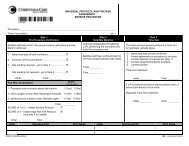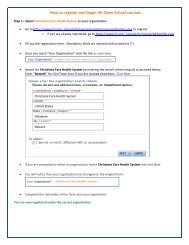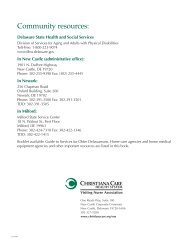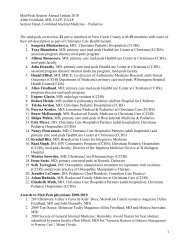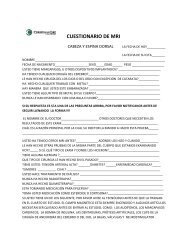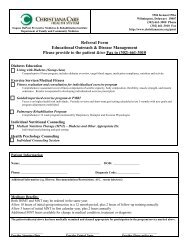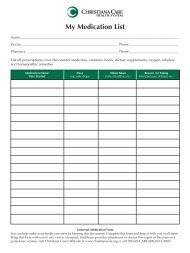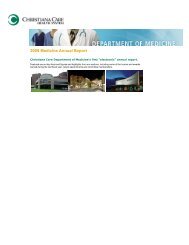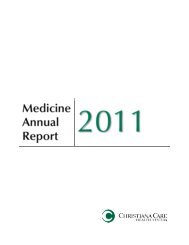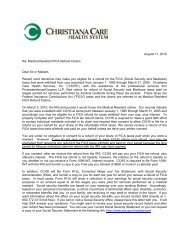Nutrition - Christiana Care Health System
Nutrition - Christiana Care Health System
Nutrition - Christiana Care Health System
You also want an ePaper? Increase the reach of your titles
YUMPU automatically turns print PDFs into web optimized ePapers that Google loves.
Good Fat – Bad Fat<br />
Why follow a cardiac diet?<br />
Saturated fats, trans fat and dietary cholesterol<br />
raise bad cholesterol levels in your blood. Blood<br />
cholesterol may build up and cause blockages in<br />
your blood vessels. This is why a diet low in<br />
saturated fat, trans fat and cholesterol is good<br />
for your heart.<br />
Fat: It’s not all bad<br />
Fats are essential to good health. They provide<br />
storage for extra calories, insulate and cushion<br />
organs, help build cell membranes, make<br />
hormones and aid in absorption and the<br />
transport of vitamins A, D, E, and K.<br />
What you may not know is this: Not all fats<br />
are created equal.<br />
Saturated fats in food can be bad.<br />
They can raise the level of “bad” cholesterol (LDL)<br />
in your blood. Cholesterol is a soft, fat-like, waxy<br />
substance found in the bloodstream and in all<br />
your body's cells. Too much bad cholesterol in the<br />
blood is a major risk for coronary heart disease.<br />
Unsaturated fats in food can be good.<br />
They can lower the “bad” cholesterol levels in<br />
your blood and help build “good” cholesterol<br />
(HDL), which seems to protect against heart<br />
disease. Unsaturated fats are found in large<br />
amounts in plant foods and they are usually<br />
liquid at room temperature.<br />
Changing the fat content of your meals to<br />
eliminate saturated sources and include<br />
unsaturated sources can usually lower<br />
your bad (LDL) cholesterol and sometimes<br />
raise your good (HDL) cholesterol.<br />
Here’s your guide to limiting bad fats and<br />
including good fats in your diet:<br />
Limit Bad Fats—Both saturated and trans fats<br />
raise your blood cholesterol levels more than<br />
anything else in your diet.<br />
Saturated fats can be avoided by limiting:<br />
■ Butter, cheese, ice cream, whole and 2% milk.<br />
■ Red meat and poultry skin.<br />
■ Palm and coconut oils.<br />
■ Margarine and shortening.<br />
Trans fats, which are formed when liquid oils are<br />
solidified, can be avoided by limiting:<br />
■ Hydrogenated vegetable oils, margarine<br />
and shortening.<br />
■ Deep-fried foods.<br />
■ Store-bought cookies, cakes, and pastries.<br />
Include Good Fats, both monounsaturated and<br />
polyunsaturated fats.<br />
Monounsaturated fats can be found in:<br />
■ Olive, canola and peanut oil.<br />
■ Pecans, hazelnuts, pistachios, peanuts<br />
and almonds.<br />
■ Avocados.<br />
Polyunsaturated fats can be found in:<br />
■ Vegetable oils, such as corn, sunflower seed,<br />
safflower and soybean oil.<br />
■ Walnuts, pine nuts and seeds.<br />
11




